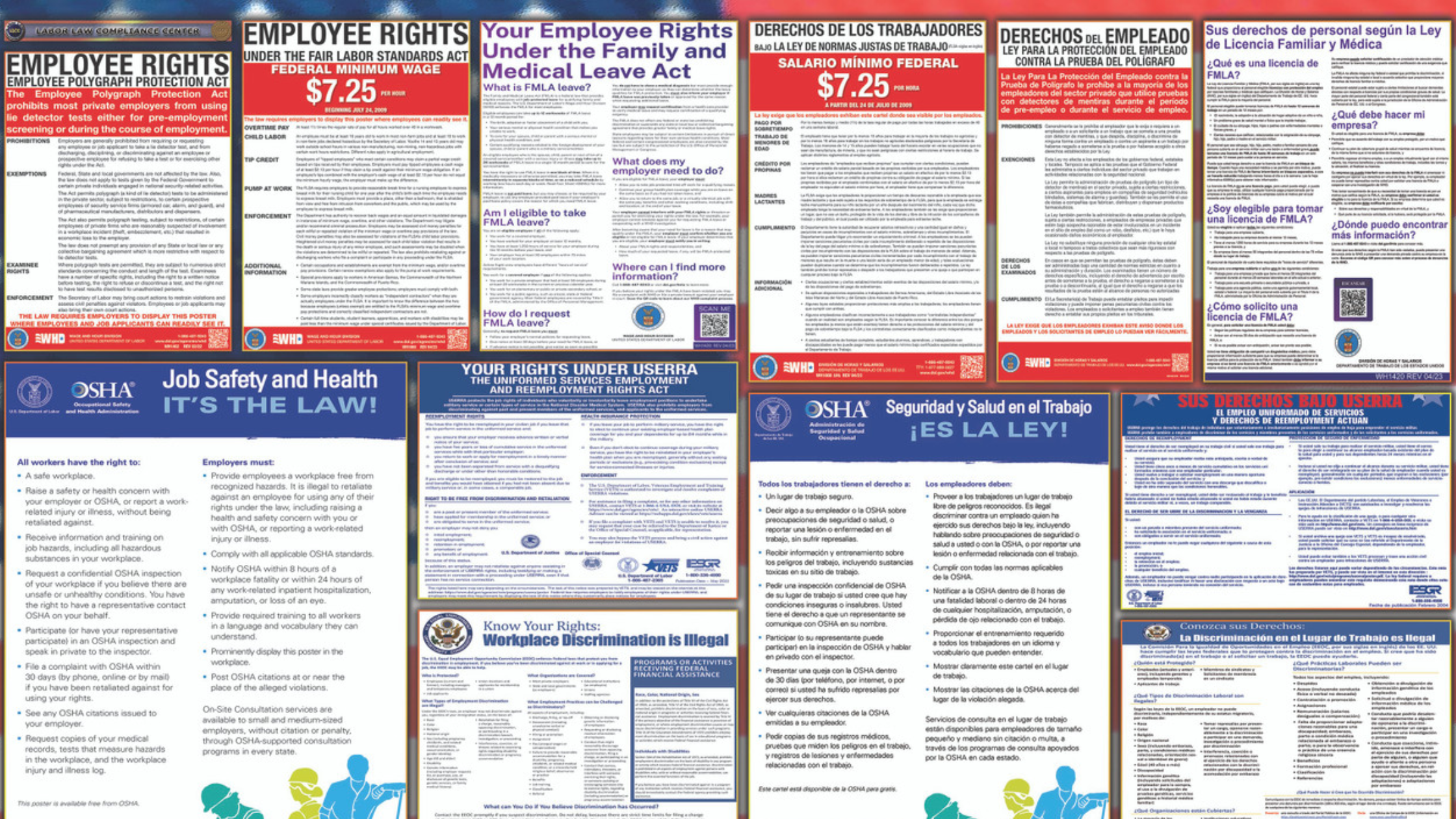One of the most common questions our team gets asked at MegaPay, especially in today’s hybrid work environment is, “We have remote and on-site employees. Do we have to post hard copies of required labor posters in the workplace, or can we provide only electronic versions for our employees?”
The short answer is that if you have both remote and on-site employees, you need to do both.
The Department of Labor (DOL) has guidelines that permit businesses to share labor posters electronically, but only under certain circumstances. For most businesses, especially those with a mix of remote and on-site staff, compliance with labor poster requirements involves both physical and electronic posting.
(Need access to labor posters? Find them here on the DOL website.)
The Department of Labor’s Guidelines for Electronic Posting
In December 2020, the DOL issued Field Assistance Bulletin 2020-07, which outlines when electronic labor poster postings may substitute physical posters. For businesses where all employees work exclusively remotely, electronic postings are permitted if all of the following conditions are met:
- All employees must work remotely – You have no on-site workers
- Employees must customarily receive information electronically – You already communicate with your employees through electronic means
- Access must be readily available – Your employees have 24/7 access to the electronic postings
For businesses that do not meet these criteria (i.e. those with a mix of remote and on-site employees) physical posters must be shown and maintained at your workplace.
Your electronic postings should be used as a supplement, not a replacement.
This ensures all employees, regardless of where they work, have access to the information required by labor laws.
Federal Labor Poster Requirements
All posters must be displayed in a place where all employees can see them. The United States Department of Labor mandates the following posters, and you can purchase them on a site like Labor Law Center.
- Fair Labor Standards Act (FLSA) Minimum Wage Poster: This poster informs employees of their rights under the Fair Labor Standards Act, including the federal minimum wage and overtime pay requirements.
- Occupational Safety and Health Act (OSHA) “Job Safety and Health: It’s the Law” Poster: Employers must post this to inform workers about their rights to a safe workplace and how to file a complaint with OSHA.
- Family and Medical Leave Act (FMLA) Poster: This informs eligible employees of their right to take unpaid leave for family and medical reasons without losing their job or health benefits.
- “Know Your Rights” Equal Employment Opportunity (EEO) Poster: The EEO poster outlines employees' rights under federal law prohibiting workplace discrimination based on race, color, religion, sex, national origin, disability, and genetic information.
- Employee Polygraph Protection Act (EPPA) Poster: This poster informs employees that employers cannot use lie detector tests for employment purposes.
- Uniformed Services Employment and Reemployment Rights Act (USERRA) Notice: This informs employees of their rights to return to their civilian job after military service and protection against discrimination.
These federal posters must be placed in a conspicuous area where on-site employees can easily see them. For remote employees, providing electronic access is permitted as a supplement under specific conditions outlined by the DOL.
State Requirements: New York and New Jersey
While federal law has their requirements, states often impose their own labor poster requirements.
Always be aware of your state’s specific regulations. For example, New York and New Jersey require the following labor posters:
New York Labor Poster Requirements
In New York, employers must display posters on topics such as minimum wage, sexual harassment, and workers’ compensation. New York also requires a Notice of Pay Rate and Payday poster.
Failure to comply can result in fines, and New York is known for actively enforcing its labor laws.
For remote workers, electronic posting is allowed under the same DOL guidelines, but New York employers need to make sure their electronic delivery methods are easily accessible.
A best practice is to post them on the company’s internal portal (like MegaPay) where employees can view them at any time.
New Jersey Labor Poster Requirements
New Jersey similarly requires posters covering topics such as wage and hour laws and family leave insurance. The state also mandates employers to display the New Jersey Conscientious Employee Protection Act (CEPA) poster, which protects whistleblowers from retaliation. New Jersey’s Wage Theft Act also requires additional posters, and penalties for non-compliance can include significant fines.
For remote workers, employers in New Jersey can provide posters electronically, but like in New York, this is only acceptable if employees have continuous, easy access to them.
MegaPay Can Help!
With today’s hybrid and remote work models, employers need to adapt their compliance strategies to ensure that all employees, regardless of where they work from, have access to the required labor posters.
As a general rule, if you have both remote and on-site employees, it’s best to provide both physical and electronic postings to meet Department of Labor and your state-specific regulations.
At MegaPay, we understand the complexities of labor law compliance and are here to help.
Contact us today to learn more about how you can use MegaPay’s portal for electronic postings of the mandatory labor posters.
 Meet the platform.
Meet the platform.





